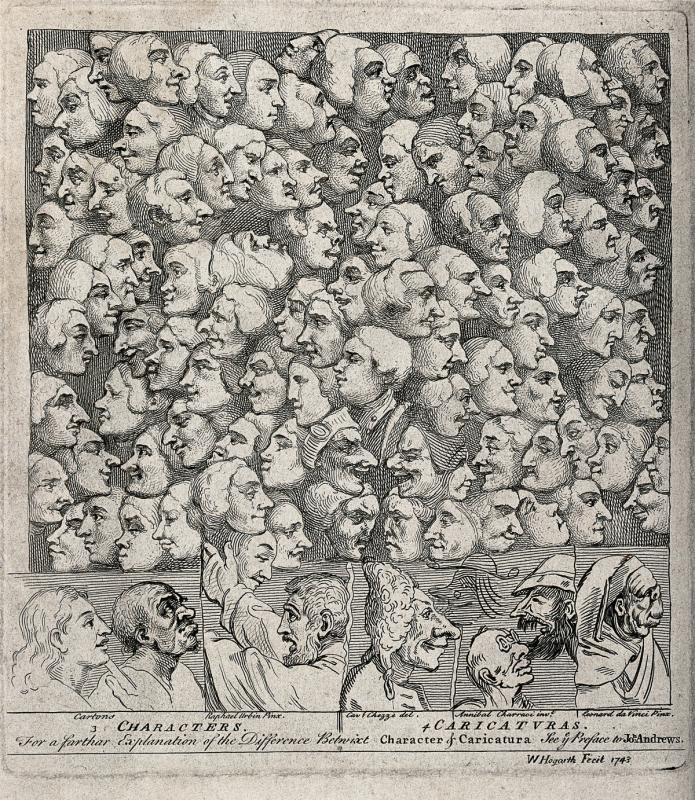Quote
The Fable of the Bees (1714)
"In half an hour, the nation round,
Meat fell a penny in the pound.
The mask hypocrisy’s sitting down,
From the great statesman to the clown:"
Links to the Encyclopedia:
Keywords
...
Thus vice nurs’d ingenuity,
Which join’d the time and industry,
Had carry’d life’s conveniences,
Its real pleasures, comforts, ease,
To such a height, the very poor
Liv’d better than the rich before.
And nothing could be added more.
How vain is mortal happiness!
Had they but known the bounds of bliss;
And that perfection here below
Is more than gods can well bestow;
The grumbling brutes had been content
With ministers and government.
But they, at every ill success,
Like creatures lost without redress,
Curs’d politicians, armies, fleets;
While every one cry’d, damn the cheats,
And would, though conscious of his own,
In others barb’rously bear none.
One, that had got a princely store,
By cheating master, king, and poor,
Dar’d cry aloud, the land must sink
For all its fraud; and whom d’ye think
The sermonizing rascal chid?
A glover that sold lamb for kid.
The least thing was not done amiss,
Or cross’d the public business;
But all the rogues cry’d brazenly,
Good gods, had we but honesty!
Merc’ry smil’d at th’ impudence,
And others call’d it want of sence,
Always to rail at what they lov’d:
But Jove, with indignation mov’d,
At last in anger swore, he’d rid
The bawling hive of fraud; and did.
The very moment it departs,
And honesty fills all their hearts;
There shews ’em, like th’ instructive tree,
Those crimes which they’re asham’d to see;
Which now in silence they confess,
By blushing at their ugliness;
Like children, that would hide their faults,
And by their colour own their thoughts;
Imag’ning, when they’re look’d upon,
That others see what they have done.
But, O ye gods! what consternation,
How vast and sudden was th’ alteration!
In half an hour, the nation round,
Meat fell a penny in the pound.
The mask hypocrisy’s sitting down,
From the great statesman to the clown:
And in some borrow’d looks well known,
Appear’d like strangers in their own.
The bar was silent from that day;
For now the willing debtors pay,
Ev’n what’s by creditors forgot;
Who quitted them that had it not.
Those that were in the wrong, stood mute,
And dropt the patch’d vexatious suit:
On which since nothing else can thrive,
Than lawyers in an honest hive,
All, except those that got enough,
With inkhorns by their sides troop’d off.
Justice hang’d some, set others free;
And after gaol delivery,
Her presence being no more requir’d,
With all her train and pomp retir’d.
First march’d some smiths with locks and grates,
Fetters, and doors with iron plates:
Next gaolers, turnkeys and assistants:
Before the goddess, at some distance,
Her chief and faithful minister,
’Squire Catch, the law’s great finisher,
Bore not th’ imaginary sword,
But his own tools, an ax and cord:
Then on a cloud the hood-wink’d fair,
Justice herself was push’d by air:
About her chariot, and behind,
Were serjeants, bums of every kind,
Tip-staffs, and all those officers,
That squeeze a living out of tears.
Though physic liv’d, while folks were ill,
None would prescribe, but bees of skill,
Which through the hive dispers’d so wide,
That none of them had need to ride;
Wav’d vain disputes, and strove to free
The patients of their misery;
Left drugs in cheating countries grown,
And us’d the product of their own;
Knowing the gods sent no disease,
To nations without remedies.
Their clergy rous’d from laziness,
Laid not their charge on journey-bees;
But serv’d themselves, exempt from vice,
The gods with pray’r and sacrifice;
All those, that were unfit, or knew,
Their service might be spar’d, withdrew:
Nor was their business for so many,
(If th’ honest stand in need of any,)
Few only with the high-priest staid,
To whom the rest obedience paid:
Himself employ’d in holy cares;
Resign’d to others state-affairs.
He chas’d no starv’ling from his door,
Nor pinch’d the wages of the poor:
But at his house the hungry’s fed,
The hireling finds unmeasur’d bread,
The needy trav’ller board and bed.
Sources
Taken from Bernard Mandeville, The Fable of the Bees: or, Private Vices Publick Benefits. Containing, Several Discourses, to Demonstrate, that Human Frailties, during the Degeneracy of Mankind, May Be Turn'd to the Advantage of the Civil Society, and Made to Supply the Place of Moral Virtues. Printed for J. Roberts, near the Oxford Arms in Warwick Lane (London), 1714, p. 9-14 (lines 197-304). Full text in ECCO.
